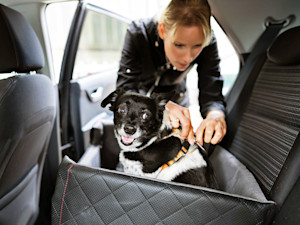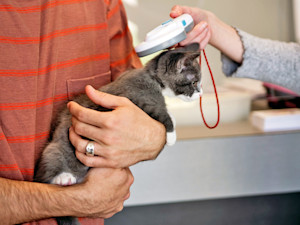How Can I Get a Pet Passport in the UK?
Don’t start packing those treats just yet...

Share Article
In this article:
What’s a pet passport?opens in a new tab Where to get a pet passportopens in a new tab Countries without pet passportsopens in a new tab What‘s on a pet passport?opens in a new tab Pet passport costopens in a new tab Which animals need pet passports?opens in a new tab Pet passport FAQsopens in a new tab
Thinking of jetting off on holiday with your four-legged friend? Be prepared for a bit of paperwork and a lot of extra planning.
The days of the convenient EU pet passport are behind us, and now pet parents must navigate a new process involving Animal Health Certificates (AHCs) to be able to travel abroad with their beloved companions. Added to which, each country has their own entry requirements, not to mention their own rules about whether animals can accompany their pet parents on the plane.

littleKin™ is Kinship’s home just for puppy and kitten parents. Bop over to check out expert advice, new pet tools, and special deals—all curated for your newest family member.
opens in a new tabConfused? Don’t panic. Exploring the sights of the world is available for you both, you’re just going to have to do some admin first. Read on to discover what a pet passport is, when you’ll need one, how much it costs and how to say, “A delicious Aperol Spritz for me and a tasty holiday treat for my four-legged companion here” in seven different languages (just kidding – you can work that one out on your own).
What is a pet passport?
With the UK’s departure from the EU, the EU pet passport is now a thing of the past for British pet parents. Since 1 January 2021, Great Britain has bid adieu to the EU’s pet passport scheme, and instead, every pet must be armed with an Animal Health Certificate (AHC) for European adventures. Countries outside the EU have their own rules which much be followed.
Northern Ireland, however, has retained its membership in the EU pet travel scheme. So, if you’re lucky enough to possess a pet passport issued in Northern Ireland, you might catch a break. But it’s always best to double-check with your vet before you hit the road... or sky. However, because of this, pet parents will need an AHC to travel to Northern Ireland from England, Wales or Scotland. Despite them being part of the UK.
Brexit means… Brexit?
The centrepiece of your pet’s travel documents is the Animal Health Certificate (AHC). These 10–14-page documents, packed with all the vital info about your pet – from microchip details to rabies vaccination records – are essential for entry into any European Union countryopens in a new tab and Northern Ireland.
But (and that’s a big but…) an AHC is a one-trip wonder; each journey calls for a fresh certificate.
Venturing to a non-EU countryopens in a new tab with your pet? You’ll need to get your hands on an Export Health Certificate (EHC). For those in England, Scotland or Wales, you’ll also need to complete an Export Application Form (EXA).
An EHC serves as a vital check to confirm that your pet satisfies the health standards mandated by your destination country. Each country and pet necessitates its own EHC, providing tailored guidanceopens in a new tab on the application process. This means that the price for each country will vary, too.
Where can I get a pet passport?
Getting your paws on an AHC involves a visit to your vet, where they will confirm that your pet is microchipped, vaccinated against rabies and other necessary treatments have been documented.
The clock starts ticking from the moment the certificate is issued – it’s only valid for 10 days before your travel date and remains valid for four months for onward travel within the EU and return to Great Britain, so planning ahead is key, especially during busy travel seasons.
Besides the AHC, there are additional requirements for pets travelling to the EU:
Microchipping: every pet must be microchipped for identification purposes (currently a legal requirement for dogs over eight weeks, and for cats over 20 weeks in the UK).
Rabies vaccination: pets must be vaccinated against rabies, with a waiting period of at least 21 days before travel.
Tapeworm treatment: dogs must also undergo tapeworm treatment within a specific time frame for travel to certain countries.
The clock starts ticking when your vet issues the AHC – it’s only valid for 10 days before your travel date, so timing is crucial. Plus, if your pet still needs vaccinations or treatments, you’ll need to factor in additional wait times.
You will need to wait 21 days after any primary vaccinations before you travel so bear this in mind when you are planning your travel and AHC appointment, according to the Royal Veterinary Collegeopens in a new tab. It’s also worth noting that your pet must be at least 12 weeks old before they can be vaccinated, so you won’t be able to take a puppy or kitten on holiday before then.
Dogs must also be treated for tapewormopens in a new tab for direct travel to Finland, Ireland, Malta, Northern Ireland and Norway. The treatment must have been given no less than 24 hours and no more than 120 hours (five days) before you arrive and it must be recorded in an AHC.
If you’re travelling to a non-EU country and need that EHC, you’ll need to designate an official vet who will receive the EHC – they will have to verify that your pet meets all requisite health and identification criteria – and don’t forget to acquaint yourself with any supplementary regulations or prerequisites specific to your destination country before embarking on your travels.
What to do if your country doesn’t provide pet passports
Welcome to the UK post-Brexit! Prior to the end of the Brexit transition period on 1 January 2021, the UK held Part-1 listed status under the EU Pet Travel Scheme. The previous British EU Pet Passport cost between £30 to £60, permitting pet parents to transport their pets to and from the EU up to 28 times, with no restriction on the duration of their stay, as long as rabies vaccinations remained valid.
European pet passports issued from within an EU country are valid for lifeopens in a new tab as long as your pet’s rabies vaccination is in date. However, you should still double check if it’s accepted and find out if you need any other supporting documents to enter the destination country before you travel. For those of you who got a pet passport issued in Great Britain before January 1, 2021, this is no longer valid and it’s the AHC or EHC you’ll need, as well as any other requirements the country you’re heading to has for your pet.
What should my pet passport say?
The AHC requires all sorts of info about your pet but the main info that needs signing off by an ‘official veterinarian’ (some vets aren’t able to sign AHCs) is proof your pet is microchipped, so bring some proof of the date it happened, and their vaccination history if you’re visiting a vet that doesn’t already have their history on file. The proof of rabies vaccination is the big one.
For EHCs, well, that’s a bit more complicated. First, visit gov.uk and find the right export health certificateopens in a new tab for your purposes. There are 2,188 certificates to choose from and don’t be alarmed that the first one on the list is for transporting live bivalve molluscs and echinoderms. Just take a deep breath and use the search function to search cat or dog.
How much does a pet passport cost?
So, how much will all of this set you back? Firstly, you’ll need a new AHC for each trip you make, which can cost between £100–£300 per certificate. This should include the vet consultation fee, plus reviewing and finalising all your pet’s documents.
Besides the cost of the AHC, you’ll need to budget for microchipping (if they’re not already chipped), rabies vaccinations and any other required treatments (such as tapeworm treatments, and additional vaccinations or medications), which will incur further charges. Prices vary, but expect to shell out anywhere from £10–£80 for each of these.
According to the Royal Veterinary Collegeopens in a new tab, “A microchip is £16.28 and will only need to be implanted once. A rabies vaccination costs £50.40 – this will need to be repeated every three years to allow continual travel under the Pet Travel Scheme.”
Which animals in the UK must have a pet passport?
If they’re heading out of the UK, or from England, Scotland or Wales to Northern Ireland, then any live animal needs some sort of documentation, whether that’s an Export Health Certificate for travel to a non-EU country or an Animal Health Certificate
Pet passport frequently asked questions
How do I get my pet from the US to the UK?
Ready? Strap in, they haven’t made this one simple. It’s worth noting up top that if you’re coming to Northern Ireland rather than England, Scotland or Wales, there’s a different set of rulesopens in a new tab for you to follow.
First, check your dog’s breed isn’t banned in the UK. Then, check your cat or dog is microchipped with an ISO compliant microchip (your vet can check this for you). Then, make sure your pet has been vaccinated against rabies more than 21 days before they enter the UK.
Next, get your vet to issue and complete the necessary UK Health Certificate. This must then be endorsed by an Animal and Plant Health Inspection Service (APHIS) Veterinary Services Endorsement Officeropens in a new tab.
If you are travelling with a dog, your dog must then have treatment for tapeworm between one and five days before entering the UK. This can happen after the APHIS endorsement.
Make sure your airline and airport are on the approved travel listopens in a new tab.
There are pet travel companies that can help you with all of this (for a fee, of course), which tbh, might be the easiest route if you can afford it.
Are UK pet passports still valid?
Thanks to Brexit, pet passports issued in England, Wales and Scotland are no longer valid. Instead, you’ll need to obtain an Animal Health Certificate (AHC) or an Export Health Certificate (EHC) depending on whether you’re heading to an EU or non-EU country.
If however, your pet passport was issued in either an EU country or one of the following countries then you can still use that passport to travel around the EU.
Andorra
Faroe Islands
Gibraltar
Greenland
Iceland
Liechtenstein
Monaco
Northern Ireland (make it make sense)
Norway
San Marino
Switzerland
Vatican City State
Find out if you need any other supporting documents before you travel though, it’s a long way home.
References
“ Taking Your Pet Dog, Cat or Ferret Abroadopens in a new tab.” GOV.UK, GOV.UK, 21 Dec. 2020, www.gov.uk/taking-your-pet-abroad.
“ Travellers’ Points of Entry.opens in a new tab” Food Safety, food.ec.europa.eu/animals/movement-pets/travellers-points-entry_en. Accessed 19 Dec. 2024.
“ Bringing Your Pet Dog, Cat or Ferret to Great Britainopens in a new tab.” GOV.UK, GOV.UK, 24 Oct. 2024
“ Travelling with Petsopens in a new tab.” Department of Agriculture, Environment and Rural Affairs, 7 Dec. 2024

Orla Pentelow
Orla Pentelow is Kinship UK’s Senior Editor. She has previously written for British Vogue, Bustle, Yahoo and The Telegraph. When not at her desk liking dog videos she’s out and about with her rescue pup, Luna, who works primarily as chief distractor.
Related articles
![Dog in a car seat being strapped into the seat belt by their harness]() opens in a new tab
opens in a new tabHow to Keep Your Dog Safe In a Car According to Experts (and the Law)
Including how to stop them jumping out the window whilst you’re driving...
![a woman with curly hair smiles down at her daschund]() opens in a new tab
opens in a new tabHow Much Does it Cost to Have a Dog?
We got our paws on a calculator and did the research so you don’t have to
![a woman with brown hair and an orange crouches down to stroke a large stray dog]() opens in a new tab
opens in a new tabAdoption Requests In Turkey Rise After ‘Massacre’ Law, But Is it Enough to Help?
Activists from Turkish rescue centres tell us how you can support them in their most desperate hour
![a man holds a kitten while a woman scans it for microchip]() opens in a new tab
opens in a new tabCat Microchipping Law: What Happens if You Don’t Comply
Microchipping your cat is quick and painless – and it’s now required by law





